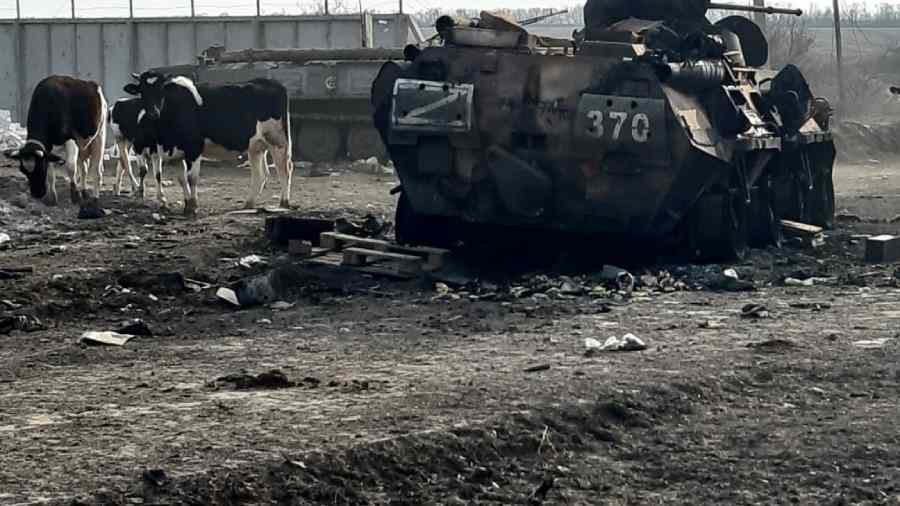The cows wouldn’t stop screaming. Russian soldiers had occupied this remote village in eastern Ukraine for about two weeks and were using a farm as a base. But the animals at the farm hadn’t been fed. Their incessant bleating was wearing on both occupiers and townspeople.
A group of five residents from Husarivka, an unassuming agricultural village of around 1,000 people, went to tend the cattle.
They were never heard from again.
“My two nephews disappeared. They went to feed the cows on the farm,” said Svitlana Tarusyna, 70. “They are gone, vanished.” What transpired in Husarivka has all the horrifying elements of the more widely publicised episodes involving Russian brutality: indiscriminate killings, abuse and torture taking place over the better part of a month.
Human rights workers around Kyiv, the capital, are gathering evidence of Russian atrocities, hoping to build the case for war crimes. But for the villagers here, the occupation’s legacy is not measured in mass killings, corpses or ruined buildings, but in the disappearances of friends and neighbours.
Though the residents are free of Russian occupation, questions about what exactly happened during those troubled days will linger for years to come.
The Russian soldiers were, for the most part, reserved after their arrival in Husarivka in the first days of March, residents said. But that quickly changed. They looted empty homes. Then they started stealing from the people who had stayed behind. It was around the time Tarusyna’s nephews and their colleagues disappeared that the occupation turned violent.
“At first, they were not wandering anywhere around at all,” said Yurii Doroshenko, 58, who is Husarivka’s de facto mayor, noting that more than 1,000 Russian soldiers were hunkered down at their headquarters — a collective farm — on the outskirts of the village. “Then, three or four days later, they started to sneak around, searching. It was around March 10 that they started to come into the houses.”
Wedged between rolling wheat fields, tracts of sunflowers and natural gas lines, Husarivka is about 60 miles southeast of Kharkiv, once Ukraine’s second-largest city. Its capture by the Russians was part of a broad advance westward that included troop movements from near Kharkiv and the more eastern city of Izium.
The Russian campaign stalled, and Ukrainian forces managed to rout the Russians from the village in March.
Husarivka is only about three miles from the front line, and it continues to be shelled incessantly, much as it was when the Russians held the area. The power and water have been out since early last month and cell service is practically non-existent, leaving the village all but isolated except for the humanitarian aid ferried in from surrounding towns. In recent days, residents have slowly started to piece together what transpired in their enclave, emerging from their basement shelters between artillery strikes. But they have been left with more questions than answers, such as: Where are the five people who disappeared around March 16 after heading off to feed the cows?
Doroshenko pointed to his frayed list of people who had disappeared or died, some from natural causes, during the occupation. The names and dates of death were written in blue ink.
“This is Yehor Shyrokin,” he said. “He was a foreman at the farm. Sergiy Krasnokutsky was working as a security guard. Olexandr Tarusyn was handing out the fodder. Olexandr Gavrysh was a tractor driver. Mykola Lozoviy was the Gazelle driver,” he said, referring to a transport truck.
Before the war, 1,060 people were registered as residents of Husarivka, Doroshenko noted on Thursday, as dark clouds rolled over his village and the thud of artillery echoed in the distance. Now most people have fled, and he estimated the number had shrunk to around 400.
New York Times News Service











